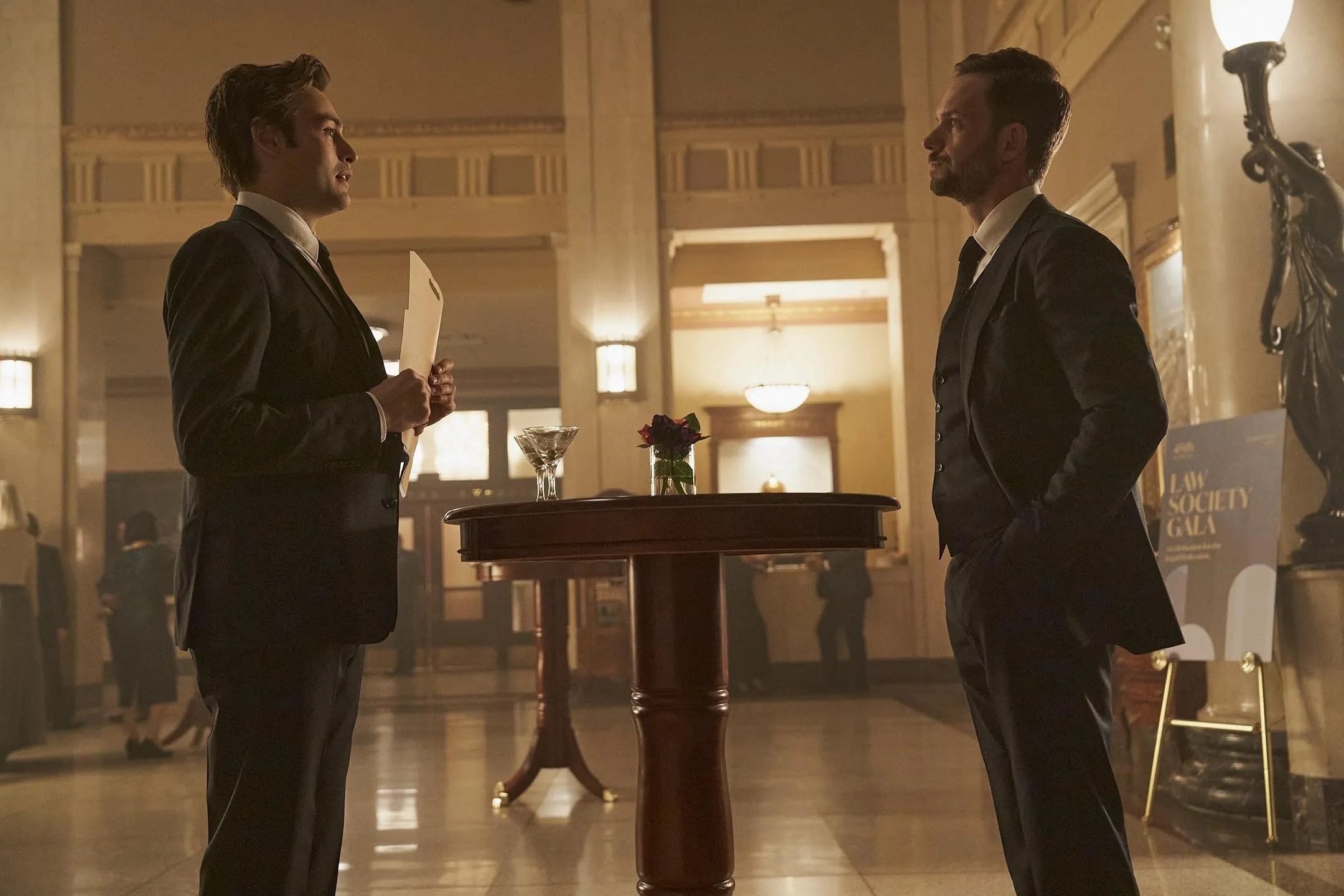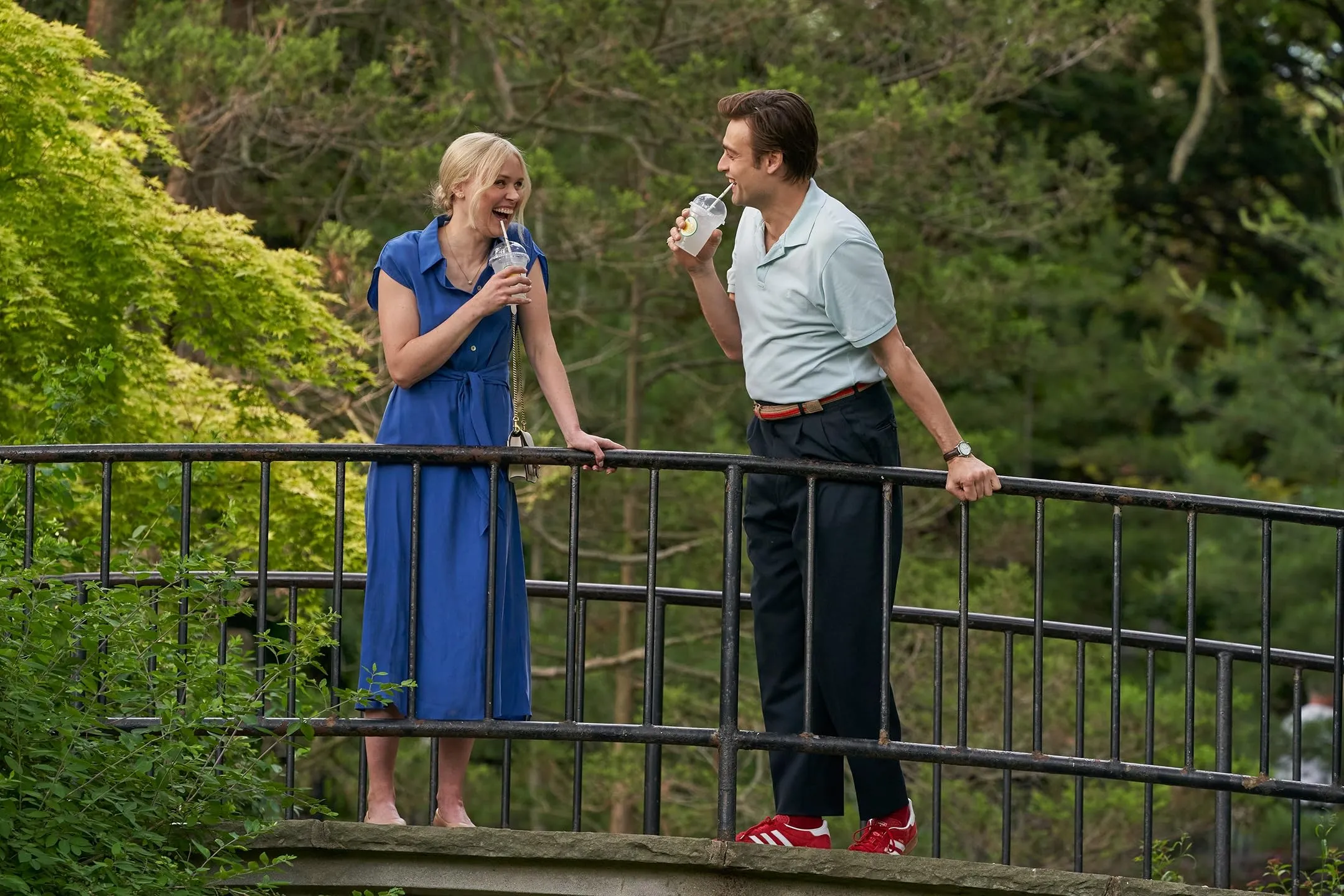Young Werther draws inspiration from the 18th-century novel by Johann Wolfgang von Goethe, yet its adaptation into Toronto’s urban landscape creates an unsettling transformation, reflecting our current era’s obsession with self-deception and impossible yearning.
In Goethe’s original, Werther’s unrequited love symbolizes youthful passion that promises redemption but leads to self-destruction. The film maintains this core narrative, moving through contemporary times with a tragic essence, filtered through a romantic comedy lens.
The film’s opening—playful in its historical reference, even mentioning Beatlemania—initially attracts viewers with a light moment before darker themes emerge.
In Toronto, Werther (Douglas Booth) wanders through a world of self-interest, intensely desiring Charlotte (Alison Pill), a woman committed to another. The modern setting provides minimal relief from his internal struggle, as he moves through the city’s warm atmosphere—a place that hints at fulfillment but never truly provides it.
Young Werther explores an existential contradiction: vibrant romance contrasted against the inevitable collapse of unfulfilled desire. What starts as a playful pursuit—filled with witty exchanges and brief connections—transforms into a painful revelation about how deep desires often expose inner emptiness.
The narrative shifts between fleeting happiness and persistent regret. Within this tension, viewers confront a profound question: Can we truly escape our desires, or are we, like Werther, forever trapped by them?
A Desire That Devours
Young Werther reveals a fractured reflection of the existential landscape Goethe created, where the absurdity of unrequited love haunts every moment. The film tracks Werther (Douglas Booth), a privileged young man arriving in Toronto for a simple task, who encounters Charlotte (Alison Pill)—a woman both mesmerizing and forbidden.
This brief interaction, a momentary spark amid urban chaos, triggers a spiraling obsession. An existential irony emerges as Werther, with his charm and naive idealism, falls for Charlotte, a woman committed to Albert (Patrick J. Adams), a steady, well-intentioned lawyer.
The narrative explores beyond romantic rivalry, diving into a deeper malaise: the destructive pursuit of an unattainable ideal. Charlotte’s engagement transforms into a challenge for Werther’s fragile ego. He weaves himself into her life, believing he offers an intense, unrestrained passion Albert cannot.
The story confronts a stark question—can love born of obsession be anything more than self-aggrandizement? Werther’s pursuit transcends Charlotte. He seeks something external that might validate his existence, as if winning her could protect him from his internal emptiness.
The love triangle unfolds with quiet determination—Werther’s charming persistence grows darker, his motivations increasingly obscure. He searches for more than love: a resolution to the unrelenting dissatisfaction clinging to him like Toronto’s oppressive humidity. Driven by desire, he ignores the truth that love built on self-projection inevitably collapses.
The Masks We Wear: Portraits of Desire and Disillusion
The characters in Young Werther embody an unspoken tension, an existential dance between self-deception and hidden longing. Werther, played by Douglas Booth, represents a paradox of youthful charm and melancholic self-absorption.
His portrayal balances a character both naïve and narcissistic, consumed by the intoxicating delusion that his feelings for Charlotte define his existence.
Booth captures Werther’s existential emptiness with an earnestness bordering on absurdity—he appears simultaneously engaging and unbearable, a man lost in personal fantasies. The performance reveals an existential crisis: a love search that, stripped of pretense, becomes a quest for meaning in an indifferent world.
Charlotte, portrayed by Alison Pill, contrasts Werther’s consuming self-regard. She carries the weight of responsibility, a woman who sacrifices personal desires for family. Pill anchors the film with a subtle performance, creating a character beyond a simple object of affection.
Her reserved nature and inner conflict emerge through quiet intensity—Pill depicts Charlotte as a woman trapped between obligation and unexpected attraction. The understated complexity prevents the story from becoming mere melodrama; Charlotte exists as a thinking individual navigating her personal choices.
Patrick J. Adams plays Albert with steady sincerity, providing a counterbalance to Werther’s emotional turmoil. His character represents groundedness that evokes a haunting sense of something Werther cannot comprehend—contentment with simplicity. Adams suggests a wisdom in Albert often overlooked by those around him, hinting at deeper emotional landscapes.
Paul (Jaouhar Ben Ayed) serves as Werther’s confidant, a character whose sardonic humor and disillusionment cut through the narrative’s emotional thickness. His presence offers moments of relief while highlighting the underlying darkness of Werther’s emotional journey. Paul’s character exposes the broader implications of one person’s desperate search for meaning.
The Tragic Spiral: Love, Obsession, and the Illusions We Live By
Young Werther explores a love that consumes, distorts, and destroys its subject. The film examines desire’s intricate nature, revealing how affection transforms into an overwhelming obsession.
Werther’s pursuit of Charlotte emerges as a delusion, a profound misinterpretation of his existential emptiness. His unrequited feelings begin innocently but reveal a tragic exploration of uncontrolled emotional intensity. The narrative exposes the psychology of a person who believes impossible love defines his entire existence.
Werther’s journey spirals into intense self-absorption. His search transcends connection—becoming an attempt to create meaning in a seemingly empty world. Douglas Booth’s performance captures this existential struggle, reflecting Goethe’s original character trapped within personal emotions.
The Toronto setting brings these destructive elements into sharp focus. Goethe’s original character meets a tragic end, while this adaptation suggests internal transformation as a potential escape from consuming desire. Self-awareness emerges as a fragile path toward understanding personal illusions, offering a glimpse of potential redemption through painful emotional recognition.
The Color of Desire: Toronto as a Canvas for Longing
Young Werther’s visual approach creates a haunting contrast—Toronto’s energetic cityscape against the protagonist’s internal emptiness. Tensions emerge between bright, sun-drenched streets and the dark recesses of Werther’s psyche.
The city vibrates with life, an uneasy energy that seems to ridicule Werther’s emotional stagnation. Cinematographer Nick Haight captures this complexity, rendering the backdrop in soft tones that shift between warmth and coldness, reflecting desire’s intricate nature.
Each frame catches blooming parks and sunlit cafes, yet maintains an undercurrent of transience—the world’s vibrancy intensifying Werther’s profound isolation.
Set design provides subtle emotional commentary. Sleek apartments and gleaming storefronts create a sterile backdrop for human emotional chaos. Color palettes—soft twilight blush and muted greys—evoke romantic undertones while suggesting time’s relentless progression and passion’s inevitable decline.
Carefully composed scenes balance connection’s warmth with existential coldness, transforming the city into both romantic playground and indifferent landscape of solitude.
The Dance of Desire and Disillusionment: Pacing and Tone
Young Werther moves with an unsettling rhythm, pulsing between light comedy and emotional depths. The pacing shifts abruptly, each moment echoing Werther’s obsessive pursuit. The film begins with playful romance, dialogue dancing with potential connection.
Werther and Charlotte’s early interactions sparkle with youthful energy, suggesting a story that might carry viewers through lighthearted emotional terrain.
Gradually, the narrative darkens and fractures. Flirtatious exchanges transform into painful emotional collisions as Werther’s fixation grows increasingly destructive.
The third act reveals a challenging transition—struggling to balance earlier moments of humor with deeper existential themes. Werther’s journey becomes a collection of fragmented reflections, an ambiguous exploration of human emotional complexity.
His self-inflicted struggle defies simple resolution, leaving viewers with a sense of unresolved tension and raw psychological complexity.
A Bittersweet Reverie: The Unfulfilled Promise of Young Werther
Young Werther emerges as a contemporary reimagining of Goethe’s tragic story, straddling worlds of romantic comedy and emotional complexity.
The film weaves charm through its narrative, offering a sly commentary on desire’s intoxicating nature. Douglas Booth and Alison Pill create engaging performances, filling the screen with playful interactions and electric chemistry. Moments of lighthearted connection pulse with life, promising an escape into romantic possibilities.
Beneath the colorful surface, an unsettling tension emerges. The film struggles to balance comedic elements with deeper emotional landscapes. Tonal shifts between playful romance and existential exploration create an uneasy viewing experience.
While the adaptation hints at obsession and unrequited love, it stops short of fully exploring these darker psychological territories. The story remains caught between genres—neither fully lighthearted comedy nor complete emotional tragedy.
Werther’s journey reflects a complex dance between surface-level attraction and profound emotional turmoil, creating a narrative that challenges traditional romantic storytelling.
The Review
Young Werther
Young Werther offers a charming but ultimately flawed take on the romantic comedy genre, veering between lighthearted whimsy and existential heaviness without fully committing to either. While its performances and visual style captivate, the tonal inconsistencies and superficial handling of deeper themes leave it lacking in depth. The film flirts with the philosophical weight of its source material but never fully immerses itself in the dark, self-destructive yearning at its heart. It entertains, but its unfulfilled promise lingers.
PROS
- Strong performances from Douglas Booth and Alison Pill, particularly in their chemistry.
- Visually appealing, with a vibrant Toronto backdrop and thoughtful cinematography.
CONS
- Tonal inconsistencies between lighthearted moments and darker themes.
- Lack of depth in exploring the more existential aspects of the source material.
- The third act feels rushed and anticlimactic.
- Somewhat derivative in its approach to the rom-com genre.





















































